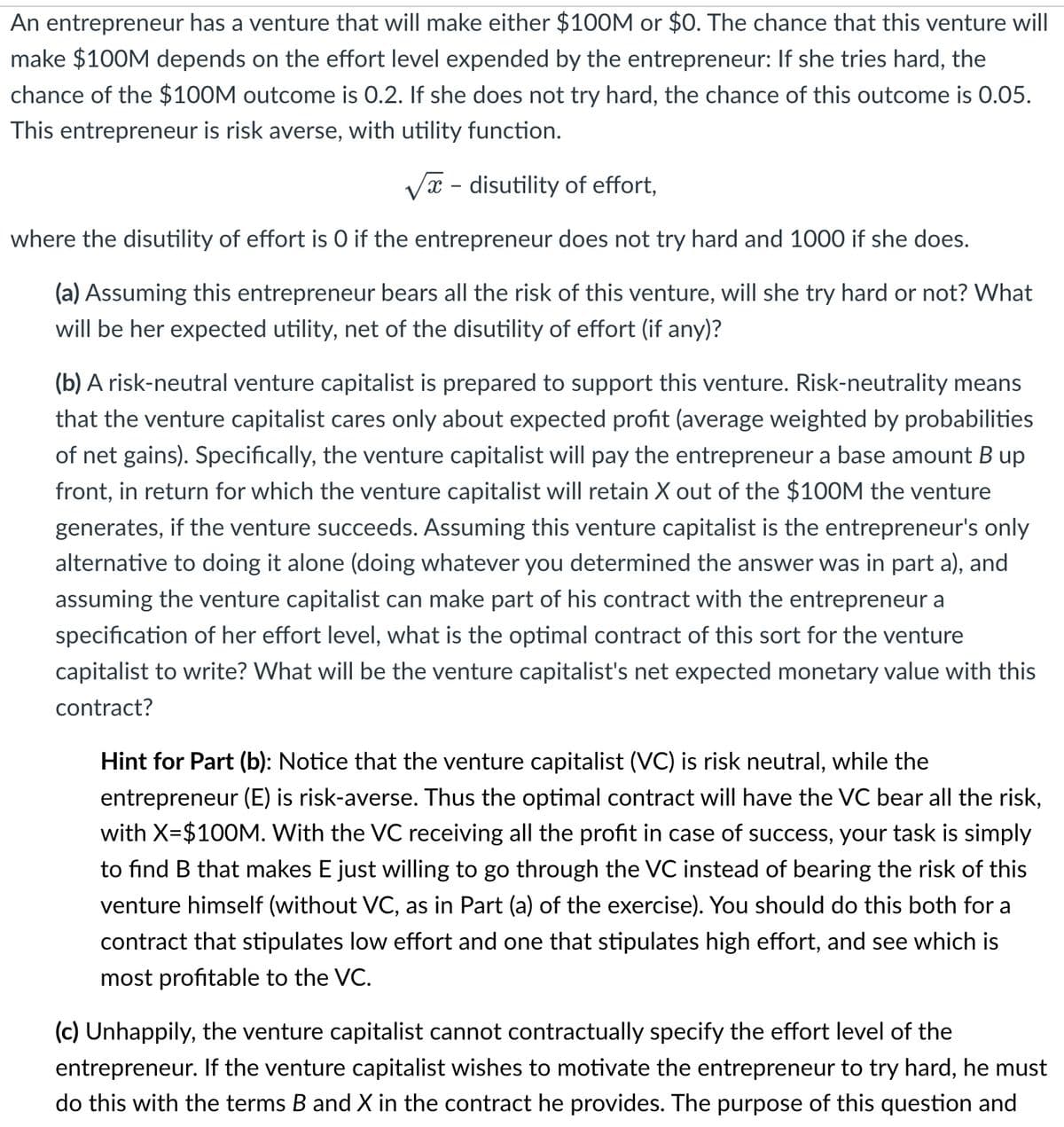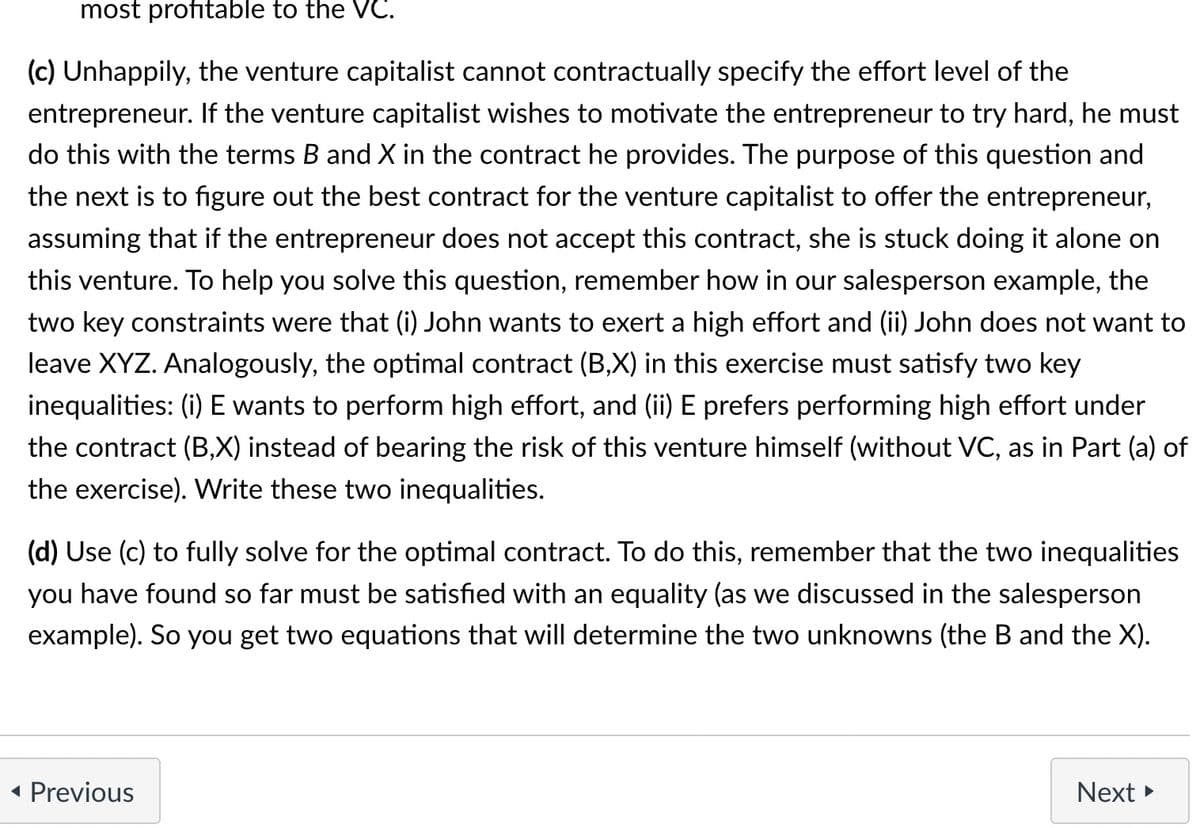An entrepreneur has a venture that will make either $100M or $0. The chance that this venture will make $100M depends on the effort level expended by the entrepreneur: If she tries hard, the chance of the $100M outcome is 0.2. If she does not try hard, the chance of this outcome is 0.05. This entrepreneur is risk averse, with utility function. √x - disutility of effort, where the disutility of effort is O if the entrepreneur does not try hard and 1000 if she does. (a) Assuming this entrepreneur bears all the risk of this venture, will she try hard or not? What will be her expected utility, net of the disutility of effort (if any)? (b) A risk-neutral venture capitalist is prepared to support this venture. Risk-neutrality means that the venture capitalist cares only about expected profit (average weighted by probabilities of net gains). Specifically, the venture capitalist will pay the entrepreneur a base amount B up front, in return for which the venture capitalist will retain X out of the $100M the venture generates, if the venture succeeds. Assuming this venture capitalist is the entrepreneur's only alternative to doing it alone (doing whatever you determined the answer was in part a), and assuming the venture capitalist can make part of his contract with the entrepreneur a specification of her effort level, what is the optimal contract of this sort for the venture capitalist to write? What will be the venture capitalist's net expected monetary value with this contract? Hint for Part (b): Notice that the venture capitalist (VC) is risk neutral, while the entrepreneur (E) is risk-averse. Thus the optimal contract will have the VC bear all the risk, with X=$100M. With the VC receiving all the profit in case of success, your task is simply to find B that makes E just willing to go through the VC instead of bearing the risk of this venture himself (without VC, as in Part (a) of the exercise). You should do this both for a contract that stipulates low effort and one that stipulates high effort, and see which is most profitable to the VC. (c) Unhappily, the venture capitalist cannot contractually specify the effort level of the entrepreneur. If the venture capitalist wishes to motivate the entrepreneur to try hard, he must do this with the terms B and X in the contract he provides. The purpose of this question and
An entrepreneur has a venture that will make either $100M or $0. The chance that this venture will make $100M depends on the effort level expended by the entrepreneur: If she tries hard, the chance of the $100M outcome is 0.2. If she does not try hard, the chance of this outcome is 0.05. This entrepreneur is risk averse, with utility function. √x - disutility of effort, where the disutility of effort is O if the entrepreneur does not try hard and 1000 if she does. (a) Assuming this entrepreneur bears all the risk of this venture, will she try hard or not? What will be her expected utility, net of the disutility of effort (if any)? (b) A risk-neutral venture capitalist is prepared to support this venture. Risk-neutrality means that the venture capitalist cares only about expected profit (average weighted by probabilities of net gains). Specifically, the venture capitalist will pay the entrepreneur a base amount B up front, in return for which the venture capitalist will retain X out of the $100M the venture generates, if the venture succeeds. Assuming this venture capitalist is the entrepreneur's only alternative to doing it alone (doing whatever you determined the answer was in part a), and assuming the venture capitalist can make part of his contract with the entrepreneur a specification of her effort level, what is the optimal contract of this sort for the venture capitalist to write? What will be the venture capitalist's net expected monetary value with this contract? Hint for Part (b): Notice that the venture capitalist (VC) is risk neutral, while the entrepreneur (E) is risk-averse. Thus the optimal contract will have the VC bear all the risk, with X=$100M. With the VC receiving all the profit in case of success, your task is simply to find B that makes E just willing to go through the VC instead of bearing the risk of this venture himself (without VC, as in Part (a) of the exercise). You should do this both for a contract that stipulates low effort and one that stipulates high effort, and see which is most profitable to the VC. (c) Unhappily, the venture capitalist cannot contractually specify the effort level of the entrepreneur. If the venture capitalist wishes to motivate the entrepreneur to try hard, he must do this with the terms B and X in the contract he provides. The purpose of this question and
Chapter7: Uncertainty
Section: Chapter Questions
Problem 7.5P
Related questions
Question

Transcribed Image Text:An entrepreneur has a venture that will make either $100M or $0. The chance that this venture will
make $100M depends on the effort level expended by the entrepreneur: If she tries hard, the
chance of the $100M outcome is 0.2. If she does not try hard, the chance of this outcome is 0.05.
This entrepreneur is risk averse, with utility function.
- disutility of effort,
where the disutility of effort is O if the entrepreneur does not try hard and 1000 if she does.
(a) Assuming this entrepreneur bears all the risk of this venture, will she try hard or not? What
will be her expected utility, net of the disutility of effort (if any)?
(b) A risk-neutral venture capitalist is prepared to support this venture. Risk-neutrality means
that the venture capitalist cares only about expected profit (average weighted by probabilities
of net gains). Specifically, the venture capitalist will pay the entrepreneur a base amount B up
front, in return for which the venture capitalist will retain X out of the $100M the venture
generates, if the venture succeeds. Assuming this venture capitalist is the entrepreneur's only
alternative to doing it alone (doing whatever you determined the answer was in part a), and
assuming the venture capitalist can make part of his contract with the entrepreneur a
specification of her effort level, what is the optimal contract of this sort for the venture
capitalist to write? What will be the venture capitalist's net expected monetary value with this
contract?
Hint for Part (b): Notice that the venture capitalist (VC) is risk neutral, while the
entrepreneur (E) is risk-averse. Thus the optimal contract will have the VC bear all the risk,
with X=$100M. With the VC receiving all the profit in case of success, your task is simply
to find B that makes E just willing to go through the VC instead of bearing the risk of this
venture himself (without VC, as in Part (a) of the exercise). You should do this both for a
contract that stipulates low effort and one that stipulates high effort, and see which is
most profitable to the VC.
(c) Unhappily, the venture capitalist cannot contractually specify the effort level of the
entrepreneur. If the venture capitalist wishes to motivate the entrepreneur to try hard, he must
do this with the terms B and X in the contract he provides. The purpose of this question and

Transcribed Image Text:most profitable to the VC.
(c) Unhappily, the venture capitalist cannot contractually specify the effort level of the
entrepreneur. If the venture capitalist wishes to motivate the entrepreneur to try hard, he must
do this with the terms B and X in the contract he provides. The purpose of this question and
the next is to figure out the best contract for the venture capitalist to offer the entrepreneur,
assuming that if the entrepreneur does not accept this contract, she is stuck doing it alone on
this venture. To help you solve this question, remember how in our salesperson example, the
two key constraints were that (i) John wants to exert a high effort and (ii) John does not want to
leave XYZ. Analogously, the optimal contract (B,X) in this exercise must satisfy two key
inequalities: (i) E wants to perform high effort, and (ii) E prefers performing high effort under
the contract (B,X) instead of bearing the risk of this venture himself (without VC, as in Part (a) of
the exercise). Write these two inequalities.
(d) Use (c) to fully solve for the optimal contract. To do this, remember that the two inequalities
you have found so far must be satisfied with an equality (as we discussed in the salesperson
example). So you get two equations that will determine the two unknowns (the B and the X).
◄ Previous
Next ►
Expert Solution
This question has been solved!
Explore an expertly crafted, step-by-step solution for a thorough understanding of key concepts.
Step by step
Solved in 5 steps

Knowledge Booster
Learn more about
Need a deep-dive on the concept behind this application? Look no further. Learn more about this topic, economics and related others by exploring similar questions and additional content below.Recommended textbooks for you


Brief Principles of Macroeconomics (MindTap Cours…
Economics
ISBN:
9781337091985
Author:
N. Gregory Mankiw
Publisher:
Cengage Learning

Essentials of Economics (MindTap Course List)
Economics
ISBN:
9781337091992
Author:
N. Gregory Mankiw
Publisher:
Cengage Learning


Brief Principles of Macroeconomics (MindTap Cours…
Economics
ISBN:
9781337091985
Author:
N. Gregory Mankiw
Publisher:
Cengage Learning

Essentials of Economics (MindTap Course List)
Economics
ISBN:
9781337091992
Author:
N. Gregory Mankiw
Publisher:
Cengage Learning